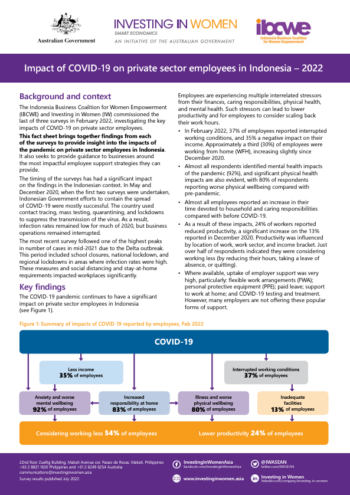27 June 2020 | Fact Sheet
Impact of COVID-19 on private sector employees
Summary
This series of fact sheets on the impact of COVID-19 on private sector employees in Indonesia, the Philippines, and Vietnam provide a comprehensive analysis of the pandemic’s effects on work conditions, mental and physical well-being, and financial stability. Key findings include reduced productivity, increased mental health issues, and a significant gendered impact on household responsibilities. The reports highlight the role of flexible work arrangements and the importance of supportive policies to mitigate negative effects. Despite challenges, the reports also note some positive changes, such as increased remote work and digital adaptation.
Highlights
- Indonesia 2022: Continued productivity issues and mental health impacts; flexible work arrangements are essential for adaptation.
- Philippines 2022: Financial instability and increased domestic responsibilities; flexible work and supportive policies help mitigate impacts.
- Vietnam 2022: Similar challenges in productivity and well-being; significant digital adaptation noted.
- Indonesia 2021: Increased mental health concerns and productivity challenges; supportive policies for employee well-being are crucial.
- Philippines 2021: Financial strain and domestic burden increases; remote work and flexibility help manage impacts.
- Vietnam 2021: Persistent productivity and mental health challenges; digital solutions support adaptation.
- Indonesia 2020: Early pandemic impacts include reduced hours and pay cuts; mental health support needed.
- Philippines 2020: Initial financial and domestic impacts highlight the need for employer flexibility and support.
- Vietnam 2020: Early impacts show significant income loss and increased domestic duties; importance of supportive policies.
Download Resources Here

Published by: IBCWE, Investing in Women, PBCWE, VBCWE
View other Resources
Applying the Asian Development Bank’s Approach to Gender Mainstreaming in Private Sector
This tip sheet provides an overview of how ADB mainstreams gender into private sector projects and the business case for advancing gender equality.
Impact of COVID-19 on private sector employees in the Philippines – 2022
This fact sheet provides an overview of the impacts of COVID-19 on private sector employees in the Philippines in 2022, based on a survey commissioned by PBCWE.
Impact of COVID-19 on private-sector employees in Vietnam – 2022
This fact sheet provides an overview of the impacts of COVID-19 on private sector employees in Vietnam in 2022, based on a survey commissioned by VBCWE.

